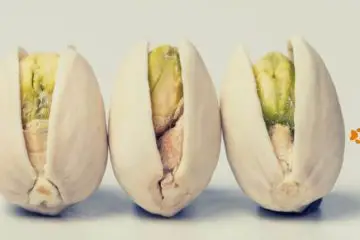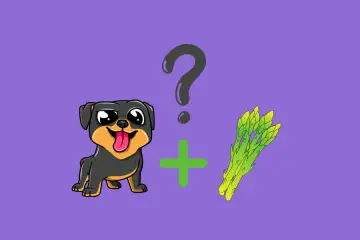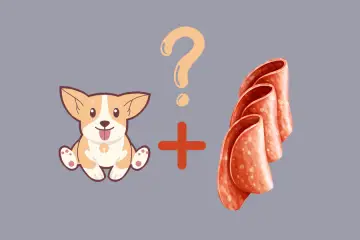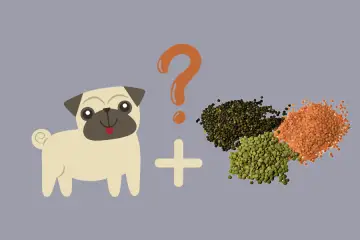Key Takeaways
- Can dogs eat pears? The answer is yes! Pears are a great source of dietary fiber, vitamin C and K, as well as potassium.
- Pears are safe for dogs to eat in moderation, but they should not be treated as a meal replacement.
- The seeds and core of pears can pose a choking hazard if swallowed whole, so you should always cut the pear into small pieces before giving it to your pup.
- Instead of giving them canned pears, choose fresh pears.
Benefits of Pear for Dogs
Can dogs eat pears? Pears are great human food, packed with nutrition. Some health benefits include:
- They are high in fiber, low in calories and can help your dog feel full longer.
- They also provide essential vitamins and minerals including vitamin C, folate, copper, and potassium.
- Eating pears may even help reduce inflammation, improve gut health and reduce blood sugar levels.
Risks of Feeding Pears to Dogs
Though pears are generally safe for dogs, there are some potential risks to be aware of:
- Pears contain high levels of sugar, so they should only be given as an occasional treat in moderation.
- The seeds and core can also pose a choking hazard if swallowed whole. You should always cut the pear into small pieces before giving it to your pup.
Other than that, pears are safe for dogs to eat, however, you should keep in mind that moderation is key and pears should not be treated as a meal replacement.
Are Pear Seeds Safe for Dogs?
With their sweet, juicy taste and crunchy texture, pears are a popular snack among humans and animals alike. But when it comes to dogs, it’s important to know if pear seeds pose any danger.
Pear seeds contain trace amounts of amygdalin, a compound that can release cyanide in the body after being consumed. You don’t need to worry too much: while they do contain a minimal amount of amygdalin, pear seeds wouldn’t be enough to harm your pup. As long as you stick with feeding your dog the flesh of a pear (minus the core), your dog should remain safe.

Is Canned Pear Good for Dogs?
Can dogs eat pears from a can? Canned pears provide a tasty treat for our canine friends, but owners should be mindful that too much of this juicy fruit could result in some tummy troubles! Pears are filled with vitamins, minerals and disease-fighting antioxidants, all of which can have positive benefits for our four-legged friends.
However, it is important to note that like all fruits and vegetables, canned pears still contain sugar. Sugar or other additives present in canned pears may cause an upset stomach or other digestive issues in dogs. As a result, it’s best to limit canned pears in your dog’s diet.
How to Safely Feed Your Dog Pears?
Pears can be a great snack for your pup, as long as you take the proper safety precautions. Before feeding your dog pears, always make sure to remove all cores and seeds, which can be harmful if ingested. It is important to also wash the pear thoroughly before cutting it into smaller pieces; this will help reduce your pup’s risk of ingesting pesticides. Finally, make sure not to give your dog large amounts of pears in one sitting.
Editor’s Note
Not all dogs will tolerate pears. My dogs (Ruby in particular) are keen on pears, but some of their canine friends are not – and that’s okay. Pears could potentially lead to stomach upset and due to high fiber content – some dogs may experience diarrhea after eating too many pears. Give your dog a small portion of pear at first and if everything is OK, you can increase the amount gradually.
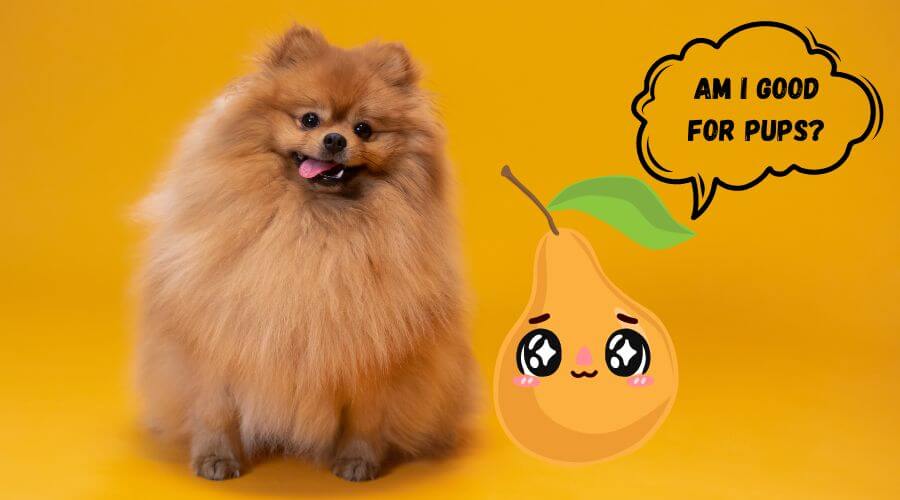
How Many Pears Should Your Dog Get?
Generally speaking, dog treats should only make up about 10% of their daily caloric intake. Too much sugar or too many calories can lead to obesity, so be sure to only give your pup small pieces of pear as an occasional treat. Also, due to high fiber content, overindulgence in pears could result in diarrhea or bloat, so it is best to only give your pup pears in moderation.
Can Dogs Eat Pears? The Bottom Line
Whether you’re a first-time dog owner or an experienced paw-parent, sometimes it can be difficult to determine the answer to “can dogs eat pears?” To the delight of all pooch parents, the answer is yes, dogs can eat pears safely. Not only can pears provide nutritional benefits due to their high fiber content; but with their sweet flavor and firm texture – they also make a fun and stimulating snack for your pet!
Before sharing fruit as a treat, be sure that the pear is washed properly, free of any chemical residue. And do not forget to core it, removing the seeds to avoid possible digestive issues. Serve only one piece at a time and keep an eye out for any adverse reactions. With this information in mind, your pup can get to munching on those juicy pears!
| Pros | Cons |
|---|---|
| full of vitamins and fiber ✔️ | high sugar content ❌ |
| safe for dogs to eat as an occasional treat ✔️ | don’t give pear seeds ❌ |
Frequently Asked Questions
Can Pears Be Toxic to Dogs?
No, pears are not toxic to dogs and can be a safe treat as long as you cut them into small pieces and remove the core and seeds. Seeds contain trace amounts of amygdalin, a compound that can release cyanide in the body after being consumed.
What Fruit Can’t Dogs Eat?
Fruits that can be dangerous for dogs include raisins, grapes, apples (seeds and core), apricots (pits), and cherries (pits). It is best to check with your vet before giving any new fruit to your pet. Additionally, avoid giving your pup canned fruits as they are often high in sugar or other additives.
Can My Dog Eat a Whole Pear?
No, your pup should not eat a whole pear. The seeds and core of pears can pose a choking hazard if swallowed whole, so you should always cut the pear into small pieces before giving it to your pup. Additionally, eating too much fruit in one sitting could lead to an upset stomach or other digestive issues.
Can Dogs Eat Apple or Pear?
Yes, dogs can safely eat both apples and pears once the seeds and core are removed. Apples are a great source of vitamins A and C as well as fiber, while pears contain dietary fiber, vitamin C and K, as well as potassium. However, be sure to feed these fruits in moderation since too much sugar can lead to obesity and other health problems.
Lucas Taylor is a veterinary assistant, freelance journalist and single dad who lives in the suburbs with his three pups: Ruby, Nala, and Woody. He has one cat named Pepper. When he’s not writing articles or working at the vet clinic, Lucas loves cooking French cuisine for himself and friends at home. One of Lucas’ favorite things to do is paddleboard with his son Noah and their canine companions. Pepper is the homebody of the bunch – she loves chilling on the couch.


